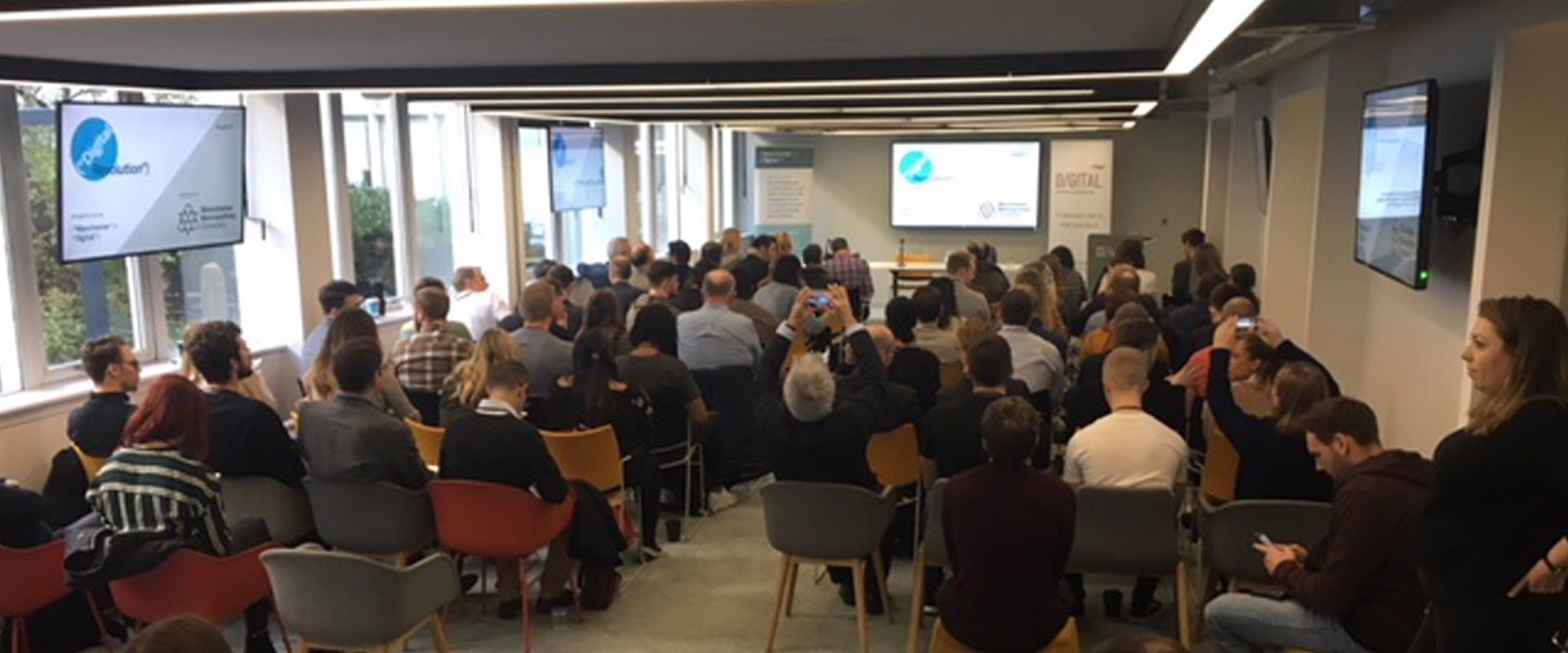As we do regularly, to keep abreast of the latest thinking in digital, we left Wigan last Friday to attend the latest installment of Manchester Digital's ‘Digital Revolution’. It's an annual event in which technology businesses from around Greater Manchester come together to discuss global trends and to understand the impact these have on our digital world.
I have to admit to not being too familiar with the geography of Manchester so I was thankful it was held at a venue I know, NCC Group's former offices on Oxford Road. We were greeted with the usual coffee and mingle session then it was straight into the main conference hall to be greeted by surprise guest speakers from GCHQ, the UK’s Governments Cyber security arm, who have decided to setup shop in the city.
Their Operations Manager talked at great length about their origins in Bletchley Park (where Manchester’s own Alan Turing played his part) and their reasons for setting up in Manchester. They also spoke about the need to partner with the digital community to combat the ever increasing threats that exist and will continue to increase in the future on the web. The key message being Manchester is a national tech hub where government agencies and large corporates want to setup and want to create partnerships which can only be good news for the region, apart from the often reported skills shortage.
This issue was then discussed by the Manchester Digital board as they focused on the tech skills shortage as well as infrastructure, digital inclusion and the region's tech strategy. As well all know, the biggest issue in the region is the lack of skilled tech candidates. There's an ongoing influx of large corporates, including Amazon and booking.com along with government bodies like GCHQ, coming to the region, but there's not enough skilled workers to fill the many roles on offer.
The topic of transferable skills came to the forefront with the tech industry now looking at graduates and more experienced candidates with skills such as maths and psychology as being a potential solution. Technology companies are now looking further afield to those people that have the core skills that are transferable and may just need training to bring them with the tech world. Another major topic discussed by the board was the current region's infrastructure. Simply put it’s not up to scratch and if we want to continue to attract people and business to the city and its Boroughs, the infrastructure needs to improve drastically. The consensus of opinion was that it needs to be state funded, which means we may be waiting a while I feel to get this problem solved - but let’s hope I am wrong.
We made the most of the great spread put on at lunch and returned to the conference hall very full and ready for our next round of speakers. The topic of the next discussion centred on the disproportionately low number women in the technology world. The session was chaired by a number of sponsors of a new initiative from Manchester Digital called ‘Digital Her’. The aim being to make school age girls aware of the opportunities in technology early and guide them in the right direction. The idea is to remove the boys only 'geeky' stigma and open up the notion of a career in digital and technology to girls. The concept has been taken to schools in a roadshow and started to make some headway in this area which is great to see as it’s something we also champion here at bd2. It’s a big mountain to climb but there are high hopes for the program's ambitions.
The next topic centred around emerging technologies. What I liked about this was that there was a jargon busting piece to start with which helped clear up my 'AI' from my 'machine learning' which is always helpful. The panel discussed the current and potential use of these emerging technologies and others such as Explainable AI, Blockchain & Augmented Reality. The most intriguing was Explainable AI. We need to be able to trust AI and to have a window into how it makes its decisions. This is Explainable AI. Trust and legislation will be the key to making sure the technology is used appropriately and is transparent to all.
Augmented Reality is now becoming used widely in advertising but also has use in the world of e-learning. Many large business are now using Augmented Reality to train staff and universities are using it to educate medical students which is creating opportunities for digital business’s in this space.
The final talk came from Carl Miller, the author of the book ‘The death of the gods – the global power shift’. At times this was a dark discussion that centred around the web's dark corners and how the power that was centred with governments and the military is now shifting to the digital world. In the book, Carl describes his journey’s across the globe and meetings with people who use the web to mobilise support and bring about change. From a music teacher who managed to get her day in court with the German government to the British army's digital soldiers who listen in on suspect Russian digital footprints, his book discusses the global shift in power and its impact on the real world. It was a real eye opener.
The day was definitely worth the investment in time as we came away with a lot to discuss and even more to think about. The future is undoubtedly exciting but challenging in equal measure for the digital world in Greater Manchester.

